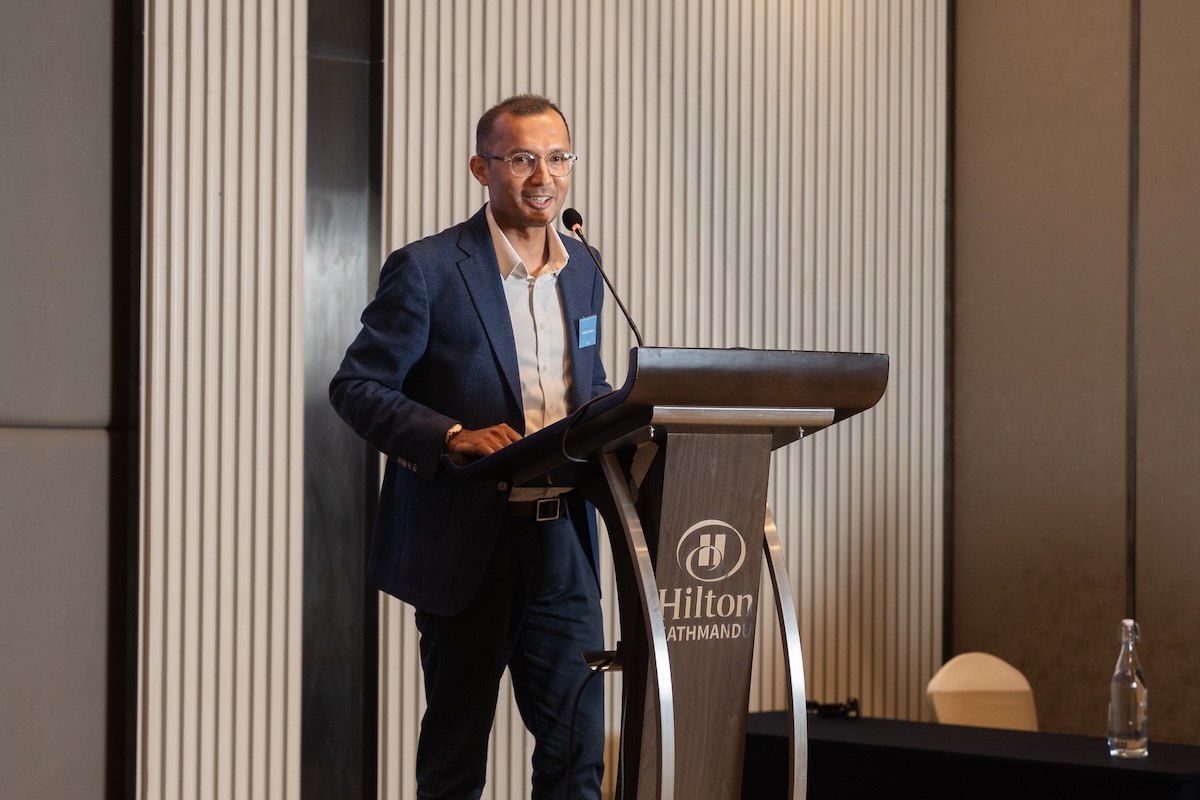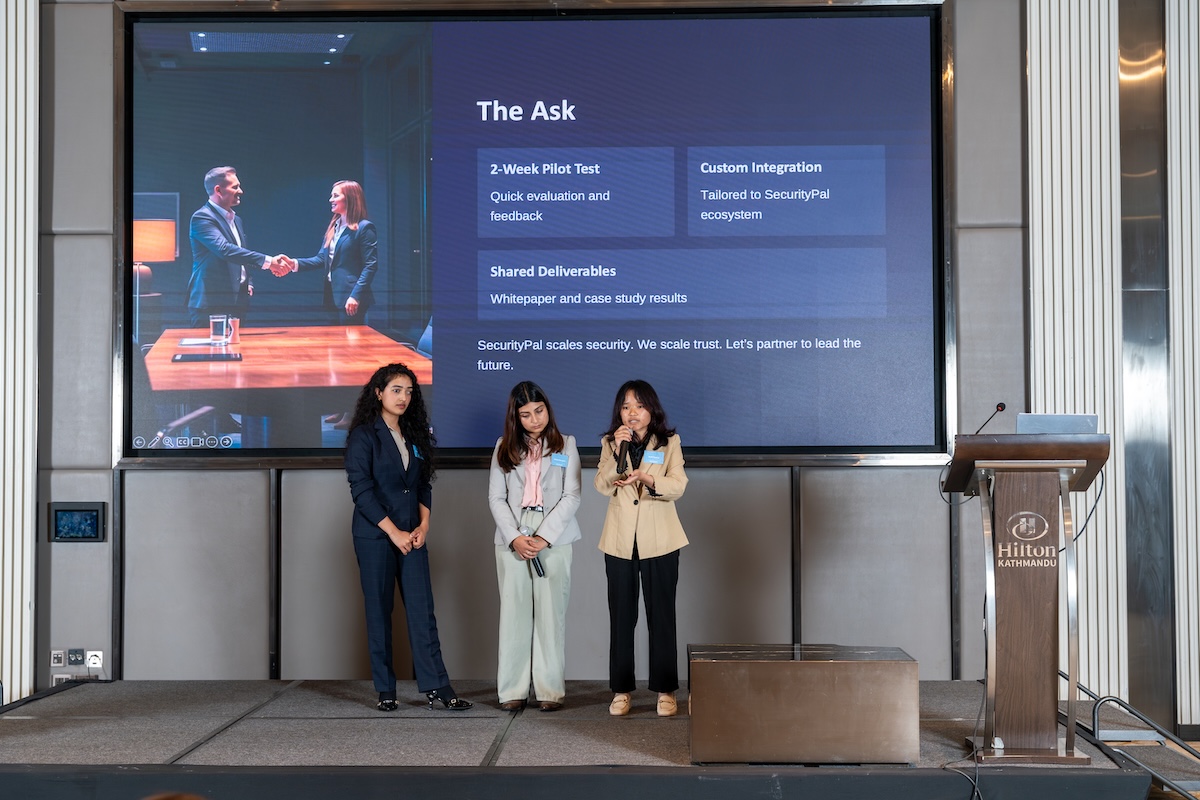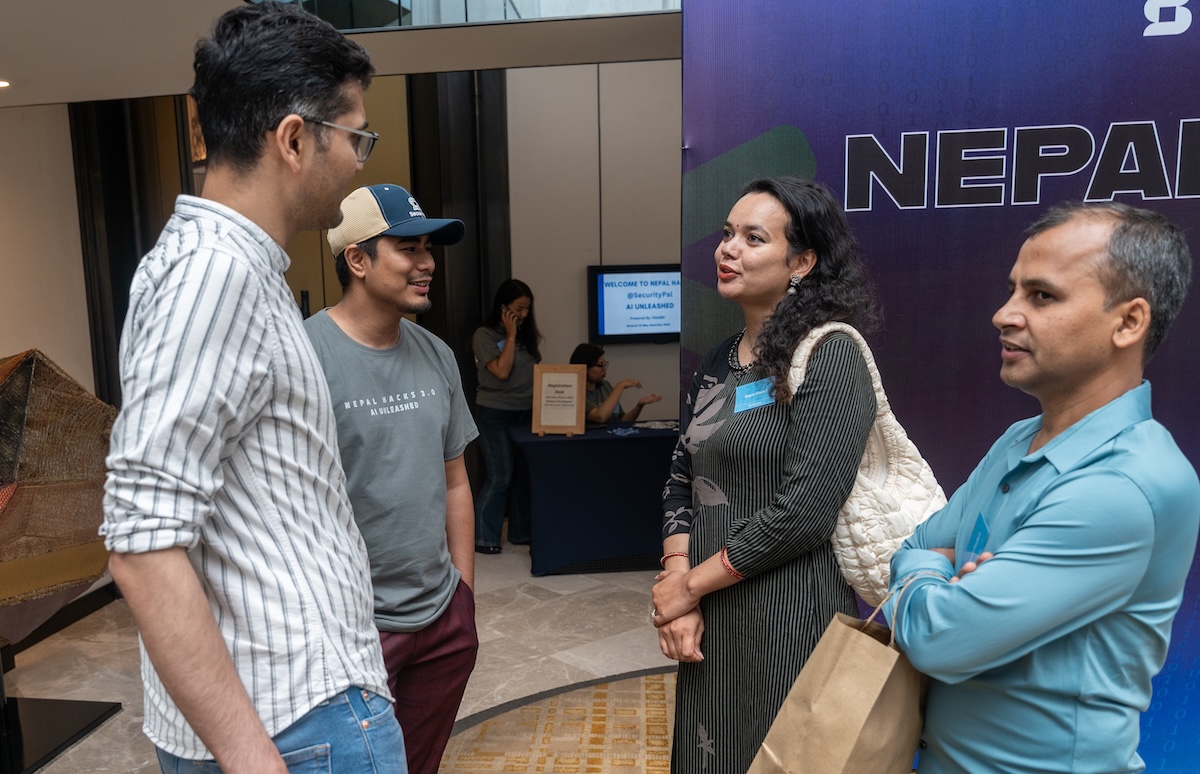Nepal Hacks @ SecurityPal 2025: AI Unleashed Recap
Inside the Biggest and Most Dynamic AI Hackathon in the Himalayas, Where the Next Generation of Innovators Took the Stage

What is Nepal Hacks @ SecurityPal?
Nepal Hacks is SecurityPal’s annual hackathon, a celebration of creativity, collaboration, and cutting-edge technology. Each year, it brings together aspiring developers, data scientists, and cybersecurity enthusiasts to co-create bold solutions to real-world problems.
Hosted by SecurityPal, a global leader in cybersecurity and vendor risk management, the event is more than a competition — it’s a launchpad for innovation, a space to mentor talent, and a glimpse into the future of tech in Nepal and beyond.
Read about previous Nepal Hacks events here.

This Year’s Theme: AI Unleashed
Our 2025 theme, “AI Unleashed”, invited participants to harness the transformative power of artificial intelligence, guided by real-world problem statements from SecurityPal and mentorship from the incredible team at NAAMII. Participants tackled challenges in cybersecurity, GRC (governance, risk, and compliance), and automation, delivering high-impact solutions.
Highlights from Nepal Hacks 2025
A Month-Long Mentorship in Innovation
Nepal Hacks @ SecurityPal: AI Unleashed — powered by NAAMII — welcomed over 300 participants into an immersive month of AI and InfoSec training. Kicking off with the opening of registrations on March 14, the community quickly grew into a vibrant 300-member WhatsApp group by March 25, where participants collaborated, asked questions, and prepared for what was to come.
From March 26 to April 19, participants attended eight virtual workshops covering everything from LLMs and retrieval-augmented generation (RAG) to contextual embeddings and GRC foundations. Each hackathon team was matched with a dedicated AI/data mentor and an InfoSec/GRC lead to guide them through the technical and domain-specific complexity of their assigned problem.
Hackathon Weekend: April 29–30
Of the 300 participants, 43 were selected to participate in the hackathon round and were divided into 13 teams. Over the course of 48 hours at SecurityPal’s Security Operations Command Center (SOCC) in Kathmandu, these teams tackled five real-world challenges with tangible product potential for SecurityPal:
- Compliance Gap Detector & Policy Analyzer
- Document-to-QnA Pair Converter
- Unified QnA Assistant (Batch & Conversational)
- Explainable Risk Scoring & Mitigation Advisor
- Knowledge Library Quality Enhancer
Teams rapidly built and demoed working prototypes, turning AI concepts into usable tools for the real world.
Demo Day & Grand Finale
On May 1, all 12 teams presented their solutions during a dry-run Demo Day, delivering 5-minutes pitches, plus 5 minutes of Q&A with the judges, including:
- Laxman Basnet (GM & VP of Global Operations at SecurityPal)
- Habish Dhakal (Data & Research Scientist at SecurityPal)
- Ashish Thapa (Engineering Lead at SecurityPal)
- Mahesh Shakya (Researcher at NAAMII)
Just two days later, on May 3, the top six teams were selected to present 8-minute demos, followed by 7 minutes of intense Q&A before an esteemed panel, including:
- John B. Park (Former Head of Product at Google)
- Renuka Shiwakoti (Product Vision Lead at InfoShapers)
- Mahesh Shakya (Researcher at NAAMII)
- Laxman Basnet (GM & VP of Global Operations at SecurityPal)
These teams took the main stage at the Hilton Kathmandu to showcase their progress in front of a full house at the Grand Finale.
“The highlight for me was seeing how drastically improved the team’s final presentations were compared to their demo-day presentations. In just a day, they improved everything from our judges’ feedback to their technical presentations and on-stage presence.”
— Ajay Basnet, Financial Controller at SecurityPal
Winner Spotlight
After a whirlwind of iteration and collaboration, our judges crowned the top three winners of Nepal Hacks 2025.
🥇 Winner: Team Brahma
Project: Unified QnA Assistant (Batch and Conversational)

Team Brahma developed a Unified InfoSec QnA Assistant capable of operating in both conversational (real-time) and batch (CSV upload) modes, retrieving answers from a structured Knowledge Library (KL) and unstructured policy documents. They built a three-tier architecture using Next.js for the frontend, Django for the backend, and FAISS for vector-based similarity search, integrated with HuggingFace embeddings and a local Llama 3.2 model. The system implements a hybrid retrieval approach, first searching the KL, then falling back to policy documents if no strong match is found, with confidence scores provided for each response. They developed separate conversational and batch engines, allowing real-time query handling with conversation history and large-scale questionnaire processing with asynchronous capabilities. To support efficient retrieval, the team cleaned the KL, generated vector embeddings for both CSV and PDF sources, and built FAISS indices for deployment.
🥈 First Runner-Up: Team Close AI
Project: Compliance Gap Detector & Policy Analyzer

Team Close AI presented an automated Compliance Gap Detector and Policy Analyzer that aligned internal security documents with standards like ISO 27001 and NIST using NLP and semantic similarity. It processed various document formats, summarized content using LLaMA 3.2, and generated embeddings with all-MiniLM for comparison. A cosine similarity engine flagged unmatched clauses, which was further assessed by a local LLaMA-based model to determine compliance relevance. The results were presented via a Streamlit dashboard with visual reports, significantly reducing manual effort and improving the accuracy of compliance assessments.
🥉 Second Runner-Up: Team APS
Project: Knowledge Library Quality Enhancer

Team APS built the Knowledge Library Quality Enhancer (KLQE), designed to identify outdated content, detect semantic duplicates, and suggest actions like merging or archiving. They used the SentenceTransformer (all-MiniLM-L6-v2) model to convert QnAs into vector embeddings and applied HDBSCAN clustering to group similar entries without needing labeled data. Outdated entries were flagged using a custom rule-based engine based on timestamps and content quality. The system features a Streamlit-based UI where end-users can review suggestions and export decisions. All processing is done locally, without internet or cloud dependencies, making it suitable for secure environments.
“The highlight for me was seeing pure joy and excitement in the faces of our winners, which was immensely rewarding. As the host, it was incredible to see how they jumped out of their seats when I called out the winners and called their loved ones at the first chance to share their happiness.”
— Asmita Joshi, People Operations Specialist at SecurityPal
Behind the Scenes: Our Judges and Partners
Meet the minds who brought Nepal Hacks 2025 to life:

Guest Judges
A senior technology leader with over 30 years of experience, John has led transformative IT initiatives across industries including high tech, financial services, and media, including leadership roles at Google and Capital Group. With degrees from UC Berkeley and UCLA, he now channels his passion for innovation into the nonprofit sector, bringing a sharp eye for impactful, real-world solutions.
Co-founder and Product Vision Lead at InfoShapers, Renuka builds web and mobile applications that span e-commerce to AI. She also serves as a part-time lecturer at Thames International College, where she mentors students on applying tech theory to practical projects — blending hands-on expertise with academic insight.
Mahesh is a Research Associate at the Nepal Applied Mathematics and Informatics Institute for Research, where he explores cutting-edge applications of mathematics and informatics. His research mindset brings rigor and analytical depth to evaluating innovative tech solutions.
Partners
Nepal Applied Mathematics and Informatics Institute (NAAMII)
The Nepal Applied Mathematics and Informatics Institute for Research (NAAMII) is redefining AI research in Nepal. Founded by Nepali scientists and engineers, NAAMII is committed to building a sustainable research ecosystem in low-resource environments. Their mentorship and technical guidance were instrumental in ensuring that participants weren’t just learning, but applying cutting-edge science to solve real problems.
Skill Lab alleviates educated unemployment, sustainably and scalably by Skilling, Re-Skilling & Up-Skilling the next generation. Their career service guidance technology helps individuals with career mapping, career exploration, capturing skills, testing skills, providing relevant training modules, and applying for jobs by collaborating with like-minded academic institutions and corporations.
“When we set out to create a hackathon three years ago, we wanted to create a platform where talent collides with real-world problems, powered by sharp mentorship and the right tools. And we wanted to do this with our trusted partners in the ecosystem. SkillLab has always been supporting us from Nepal Hacks 1.0. This year, an additional partner joined in the form of NAAMII. With them onboard, we took our vision to new heights. Around 300 registrations poured in, and the excitement only grew with every stage. Our commitment to building the Silicon Peaks is clear and unwavering — we’ll keep raising the bar and powering the next wave of builders here in the lap of the Himalayas.”
— Laxman Basnet, GM & VP of Global Operations at SecurityPal







































